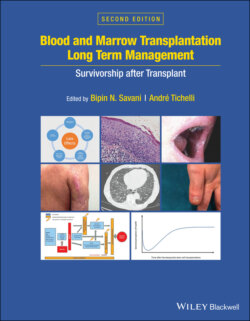Читать книгу Blood and Marrow Transplantation Long Term Management - Группа авторов - Страница 95
Neurologic complications
ОглавлениеLate neurologic effects include neurocognitive defects, neuropathy, central nervous system (CNS) GVHD, and CNS infections. Neurocognitive impairment after allogeneic‐HCT is common, and up to 40% of the HCT survivors may exhibit cognitive deficits even five years post‐HCT [49, 78]. Neuropathy in HCT survivors is highly prevalent and frequently is a result of pre‐HCT chemotherapies. CNS GVHD is an understudied area, but evidence indicating specific inflammatory GVHD changes in the brain is accumulating [50, 51], and its diagnosis requires an aggressive approach with brain biopsy since cerebrospinal fluid (CSF) analysis and brain magnetic resonance images cannot differentiate CNS GVHD from other causes. CNS infections include HHV‐6 and CMV encephalitis (see “1. Acute and chronic infections”) besides the common microbial causes of meningitis. Myasthenia gravis and demyelinating diseases, including Guillain–Barré syndrome, are rare complications. Progressive multifocal encephalopathy should also be considered in the differential diagnosis of encephalopathies if rituximab was given pre‐HCT, or for treatment of cGVHD.
